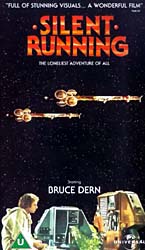Jason Maloney reviews
4-Front Video
- Cert:

- Cat.no: 078 099 3
- Running time: 86 minutes
- Year: 1972
- Pressing: 2000
- Sound: Mono
- Language: English
- Widescreen: 2.35:1
- Price: £5.99

Director:
- Douglas Trumbull
Cast:
- Freeman Lowell: Bruce Dern
Wolf: Cliff Potts
Braker: Ron Rifkin
Keenan: Jesse Vint
Voice of Anderson: Roy Engel
Drones: Steve Brown, Mark Persons, Cheryl Sparks, Larry Whisenhunt
How does humanity prevail in the face of man’s near-sighted greed and lack of respect for its own environment and eco-system?
It’s a question which tellingly remains as relevant at the turn of the 21st century as it did when the spiritual soul-searching of the Sixties was still fresh in the memory. Silent Running was made almost 30 years ago now, yet it’s potency is undimmed by the pasage of time or ravages of social and cultural upheaval.
It’s not unheard of for science fiction to evoke the most poignant emotions. Beyond the technology, the high-concepts inherent in attempting to create surroundings that are both mysterious and detached from this world, there is still scope for something closer to home. Silent Running is surely one of the most startling examples of how it can be achieved.
Douglas Trumbull‘s unforgettably poetic creation focuses more on the moral and ethical dilemmas contained in the story than beating us over the head with technical bravado. Yes, the scenario is realised with expert attention to detail and convincing special effects for its time, but its true interests and strengths lay elsewhere.
What is most striking, is just how little Silent Running – not to mention many other seminal movies from the late 1960s and early 1970s – makes any compromise to its audience. It is true film-making, not production by committee. There is an absence of bombast, of by-the-book plot development and trite characterisation. It affords the viewer a pleasing degree of intelligence and distance, allowing us to soak up the compelling atmosphere and escalating – yet beautifully understated – drama. It’s a damning indictment upon the corporate thrill-rides-for-dummies approach of modern-day mainstream American cinema.
At some unspecified point in the (then?) future, several US spaceships are orbiting the solar system, replete with carefully-preserved forests and wildlife encased in giant greenhouses. All because, it soon transpires, a Nuclear Holocaust necessitated such action to be taken in order to avoid the planet being a completely nature-free zone. The idea was to eventually return these domes after a period of time had elapsed, and things were stable on Earth.
Unfortunately, there is a change of instruction from on high, and every last one is ordered to be destroyed. For sensitive, nature-loving Bruce Dern, eight long years of preservation out in space becomes at once jepoardised and potentially obsolete. Goaded by his fellow crewmembers, who mock his beliefs and values, Dern’s character Freeman Lowell (and the situation itself) reaches a critical – and urgent – crossroads.
From then on, the real magic begins to unfold. Galvanised by a superbly nuanced performance from Dern, there is a deep poignancy running through every scene in the film. It covers the entire emotional spectrum, perfectly capturing the devastating, desolate vastness of outerspace, and the aching solitude within it. Humour is not jettisoned either, the train of events proving rich pickings for some surprisingly effective man-and-machinery relations to develop.
Any fears of Star Wars-esque cuteness in this area prove unfounded……the mini army of Drones are no Lucas creation. A poker game between Lowell and two of the Drones is an especially choice scene, conveying the advances in mutual affection and trust between master and servants which set up the major gut-wrenching pay-off moments at the film’s climax.
Once the final reel is over, and the denouement reaches its memorable conclusion, it’s hard to shake off the almost indelible images etched into this stunning piece of classic sci-fi.
Now available on the 4-Front budget price imprint through their new owners Universal Studios (who bought out Polygram last year), the film is presented in its original widescreen format, which is a very welcome bonus. This is how it should be seen – the multitude of slow, majestic camera pans across the doomed spacecraft beautifully rendered, despite the rather primitive special-effects and clearly minature models.
The sound is mono, but holds up pretty well, although the Joan Baez songs (of which there are two) are shrill and horribly dated.
At a RRP of only £5.99, this is unbeatable value… even if it is only on VHS.
PICTURE QUALITY
SOUND QUALITY











 OVERALL
OVERALL 



Check out Jason’s homepage: The Slipstream.
Reviewer of movies, videogames and music since 1994. Aortic valve operation survivor from the same year. Running DVDfever.co.uk since 2000. Nobel Peace Prize winner 2021.
